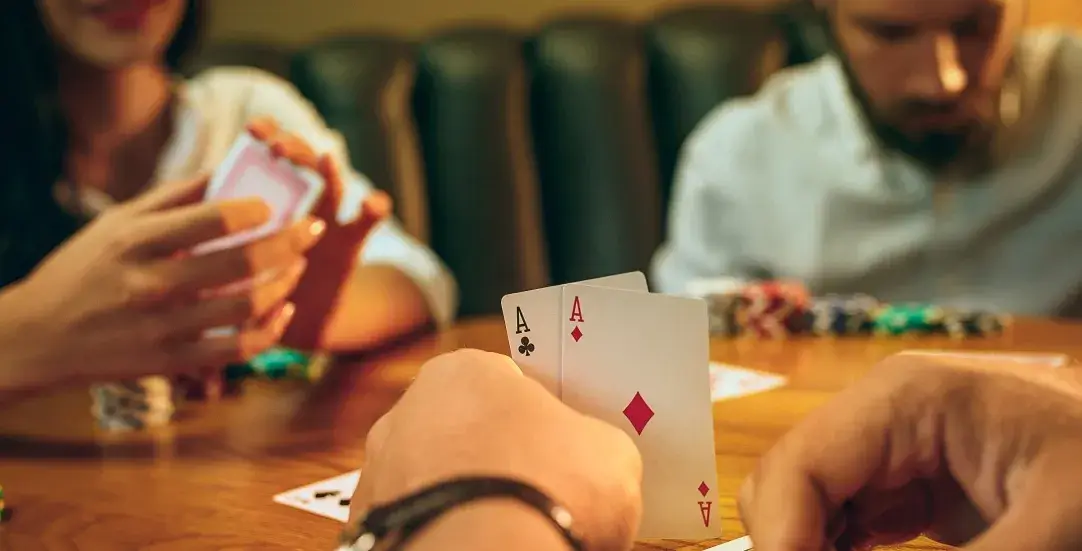Blackjack etiquette basics – what you should know

When playing various games in a casino, you have to take into account not just the actual rules. An equally important matter is etiquette – there are some unwritten rules, and breaking them can make you lose the respect of both the other players at the table and the dealer. What does proper blackjack etiquette cover?
Handling the cards
When learning how to play blackjack at a casino, etiquette should be taken into consideration from the very beginning. With blackjack being a card-based game, handling the cards is as important as knowing the rules and strategies.
The most vital rule is not touching your cards – however, that guideline doesn’t apply for variants where they are dealt facing down. Most types of blackjack have the dealer placing the cards face-up, so the players have no need to touch them in order to see their suits and ranks. What’s important is that communication with the dealer is based on a couple of universal, well-understood signs – knowing them is a major part of learning blackjack etiquette. We will cover them a bit later on, but it’s worth noting that those signals are also a useful tool for the security team members, who can’t hear what goes on at the table but have to keep control of the game.
When playing variations with face-down dealing of cards, casino blackjack etiquette is slightly different. You have to keep in mind how to touch your cards: both of your hands should be above the table, and you should always touch the cards using only one hand. Never pick up your cards and take them under the table – this rule is also related to the role of the security team in the game. Most disagreements in the casino can be settled by verifying the camera footage, and not following blackjack etiquette puts you in a losing position from the very beginning. It’s worth noting that the hand signals will have some differences as well.
Handling your chips
When playing casino blackjack, etiquette should also be taken into account when it comes to dealing with chips. Once again, the rules are intended to ensure transparency between the players, the dealer, and the security team. The key rule is to refrain from touching your chips after the cards are dealt – changing your bet at that moment would be equal to cheating. You have to be also mindful of stacking your chips: proper blackjack etiquette requires placing the highest denomination ones at the bottom, and lower chips on top of the stack.
Make sure that your chips are in the correct place as well – it should be clear to the dealer, which bets you’re intending to make. Before leaving the table, remember to ‘colour up’ – that is, exchange your less valuable chips to ones with higher denominations if applicable. This makes sure that the table has plenty of smaller chips to keep the game flowing smoothly for other players.
Interacting with the dealer
Some players prefer to tell the dealer what to do with the dealt cards, but in most cases, blackjack is a game of few words. Instead, some specific hand signals are used. Blackjack table etiquette includes a couple of gestures, which have their own meanings:
- to hit your hand, tap the table,
- in order to stand, wave over the cards,
- if you want to double, point with one finger after placing your additional bet,
- to split, do the same, but with two fingers.
Every blackjack dealer should know those, so you’ll be able to communicate your intent clearly no matter which casino you choose. However, as we said before, blackjack rules and etiquette are different when dealing the cards face-down:
- lightly scrape the table with your cards to hit,
- slide the cards under your stake to stand,
- if you want to split or double, put your hands face-up.
Keep in mind to only use one hand. Remember also to treat your dealer with respect, even if you’re having a bad game.
Blackjack tipping etiquette is another part of the whole ordeal to take into account – if you’re having a good run, it’s somewhat expected to slide your dealer a few chips. The appropriate thing to do when it comes to tipping depends on which part of the world you’re playing in.
Interacting with other players
Blackjack etiquette at a casino also covers contact with other players at the table. It’s usually frowned upon to offer unwanted advice, but feel free to share any tips if asked. Sometimes, you might come up against a particularly annoying player – it’s best to not let that get into your head and just focus on your bets and the cards in front of you.
Summary of blackjack etiquette
When learning blackjack rules, casino etiquette coupled with that can feel pretty intimidating. Don’t be discouraged, though – once you play a few games, it will probably become second nature. Here’s a quick summary of the most important rules of blackjack etiquette.
- Don’t touch your cards in standard variants of blackjack.
- In variants with the cards dealt face-down, use only one hand to touch them. Remember not to hide your cards.
- Stack your chips properly, starting from the highest ones at the bottom.
- Know the hand signals used in blackjack to keep everything clear between you, the other players, and the dealer.
- Blackjack tipping etiquette can differ somewhat based on where you’re playing. While it’s the norm in the United States, in Europe it’s often not expected, however it’s appreciated as a nice gesture to the dealer. Some Asian countries might even find it offensive – always verify what the local culture thinks of tipping before doing it.




















